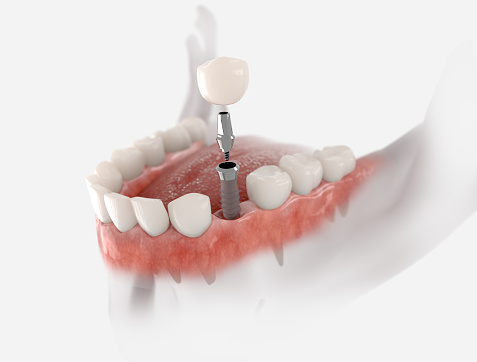Dental insurance and implants replace the root of your tooth with permanent, screwlike posts and artificial teeth that can look exactly like real ones. They feel and work just like natural teeth and are made to last for several decades.
However, they can be a tad costly. This is where dental insurance comes in to help you alleviate the pain in your pockets. Dental implants are covered by insurance, but there are several cost factors to consider. These are anesthesia, consultations, treatment before surgery, and x-rays.
Implant procedures are eligible for medical billing when they meet the threshold of medical necessity. Examples include cases that restore function by resolving a compromised ability to chew.
Keep in mind that dental insurance is not specific to dental implants. In other words, there is no such thing as a dental implant policy. Instead, dental implants are a type of treatment covered by your dental insurance, typically in the “major” services category.

Types of insurance plans
If you are shopping around for dental insurance, the first thing to take into consideration is the plan that best suits you. Dental Preferred Provider Organization (PPO) and Dental Health Maintenance Organization (DHMO) are the two most common types of plans.
DHMO and PPO plans have one key difference. DHMO insurance plans typically cover dental services at a low cost and minimal or no copayments with a pre-selected primary care dentist or a dentist facility with multiple dentists. PPO dental insurance plans, on the other hand, offer a balance between low-cost care and dentist choice.
Dental insurance shopping guide tips
How much you will pay for dental insurance depends on such factors as your age and how much coverage you want. Besides, on top of your monthly premiums, you may need to pay copayments when you visit a dentist.
Look for a plan with a high annual maximum coverage amount, low copayments and out-of-pocket costs, and a monthly premium you can afford.
The cost of a dental implant with insurance depends on how much your plan pays for coverage, your deductible, and maximum coverage limits.
Consider a dental discount plan. Dental discount plans work with a network of dentists who agree to provide patients with discounted rates. You pay a fee when you sign up for the discount plan, receive a membership card, and present it when you go for dental care to get your reduced price.
The great thing about dental discount plans is that they generally provide an in-network discount of at least 10% for covered procedures, which can include major work like implants.
Depending on the plan you choose, the waiting period may be anywhere from a month to a full year from the time you sign up for coverage. There are insurance companies that offer dental insurance with no waiting period. However, some have low annual coverage limits and high monthly premiums.
Another factor to consider is the dental plan reimbursement for dental implants. How much does the dental plan reimburse for types of care, including basic and major?
Don’t just settle for the first insurance company you come across. Shop around. Compare the different plans so you know the coverage that you are getting the coverage you need at the best available price. When comparing, be sure to get a fair comparison. Compare and contrast such things as procedures covered, in-network providers, monthly payments, services, deductibles, and waiting periods. Another key thing to research is if the coverage is offered in your state.
Read the fine print
Before you sign on the dotted line of a dental insurance plan, look carefully at the fine print. Read the fine print. Understand what is covered. If you don’t understand anything, ask for clarification.
Dental plans are not cookie cutters. They are different. You want to know such details as if there are pre-existing conditions that may exclude you from coverage.
One such detail is a clause on a missing tooth, which will not cover the implant if the tooth being replaced was extracted before your dental plan came into effect. Another detail you may need to be aware of is the rate at which the dental plan reimburses for dental implants.

Fabulous woman clothed in red sweater, with curly long hair and elegant hands is holding a mirror for looking through the final work of dental doctor.
Different providers, different plans
While shopping for dental insurance, please beware that there are different insurance plans. Some insurance plans may have limits or they may not offer implant coverage.
Some plans won’t cover dental implants, as they deem them to be a cosmetic procedure. However, there are circumstances where your medical may provide coverage for some aspects of your dental implant surgery. For instance, dental implants required after oral cancer may also be covered by medical insurance.
If your dental insurance covers the cost of implants, make sure you understand certain details. For instance, if there are any additional out-of-pocket expenses you will be responsible for and your plan’s annual limit.
If you cannot get the dental implant done in one calendar year because your insurance plan has annual maximums, consider spreading it over two calendar years.
Another factor to consider is customization. Can the plan be customized? How would you do that? You want to pay for the coverage that you need and things you will not use.
Do your due diligence. Fortunately, you can do this in the comfort of your living room. Research the company’s reviews, ratings, and reputation. Such feedback from clients will give you solid information to make an informed choice.

Dental crown, abutment and implant. 3D illustration of human teeth and dentures on white background.
Where to find dental insurance plans
Are you looking for the best dental insurance plans near you? Our mission is to help every individual understand Medicare and the benefits that are available to them.
Click here to request a quote from Nuriya Insurance Agency and get contacted immediately. Follow Nuriya Insurance Agency on Facebook here.
We look forward to serving you.

